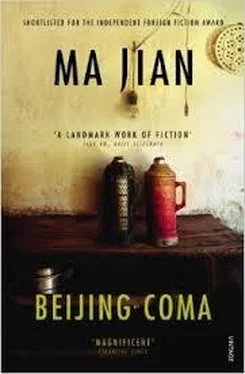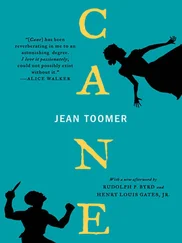Sensing that an argument was brewing, I stepped out of the tent.
The sunlight was scorching. Everyone was wearing straw hats or baseball caps, apart from a few bare-headed peasants who’d travelled up from the countryside. I saw several new faces in the crowd outside. They stared at me and the tent like curious tourists. There were fewer people in the Square that day. The flags and banners were rumpled and frayed. As I stood in the sweltering heat, I could feel sweat pouring from my thighs and groin. I turned round and retreated back into the shade of the tent.
‘Broadcast it again if you want to!’ Old Fu said, pushing his way out. ‘I don’t care any more.’
‘I’m not your damn mouthpiece, you know!’ Nuwa shouted.
‘Calm down, everyone,’ Bai Ling said, walking in with Wang Fei. ‘Wherever I go, people are having arguments.’
‘We left the Capital Joint Liaison Group meeting early,’ Wang Fei announced, sweat streaming down his face. ‘Shan Bo, that teacher from Beijing Normal, proposed that Ke Xi should take over as the student leader. He said he’s China’s Lech Wałęsa.’
‘What a wanker!’ Wu Bin said. ‘If Ke Xi became leader, our movement would disintegrate.’ His eyes were as black and shiny as tadpoles. His shaved head was shining too.
‘Ke Xi got up and bragged that all the students revere him,’ Wang Fei said. ‘It made my skin crawl.’
‘He said, “I may not be as politically accomplished as you intellectuals here, but I’m the most famous student in the Square. And with Mr Shan Bo to guide me…” ’ Bai Ling gave such a good impersonation of Ke Xi that Tian Yi chuckled, then I chuckled, and soon everyone was roaring with laughter.
‘The intellectuals are as prone to personality cults as the Communist Party,’ Chen Di said. He looked clean and fresh. He never seemed to sweat.
‘They got into a futile argument about whether the movement is a momentary aberration, or belongs to China’s long tradition of popular protest,’ Wang Fei said. ‘We couldn’t take it any more, so we got up and left.’
‘We mustn’t let those intellectuals come to the Square and stir up trouble again,’ Tian Yi said, fanning herself with a pamphlet.
‘I’d prefer to be crushed by the army than destroyed by the Joint Liaison Group,’ Wang Fei said, whipping off his sweaty vest.
‘So who’s in charge of vetoing the scripts now that Mou Sen’s gone?’ Nuwa asked. Her short hair was in a mess. There was a big tuft sticking up at the back.
‘Well Tian Yi’s chief editor, isn’t she?’ Wang Fei said. The jeans he’d borrowed were too short for him.
‘I didn’t ask you,’ Nuwa said curtly. She’d been in low spirits since Mou Sen had left the Square.
‘Hey, Wu Bin, I’ve heard you lot want to set up a special operations unit to control the Defend Tiananmen Square Headquarters,’ Wang Fei said, then sucked his cigarette and blew out a ring of smoke.
‘It’s the Square we want to control, not you lot,’ Wu Bin said calmly.
‘The only students supporting the Provincial Students’ Federation are from Wuhan Iron and Steel University and the Fushun Petroleum University,’ Wang Fei sneered. ‘What can you hope to achieve?’
‘There are 100,000 students from the provinces here now, and fewer than two thousand students from Beijing. So it’s inevitable we’ll take over control of the Square sooner or later.’
‘Over my dead body!’ Wang Fei shouted, then took a large gulp of mineral water. The water he spilt collected at his feet like a puddle of urine.
I could tell that the Y-fronts I was wearing were rancid. I reminded myself that I should go to the shops and buy Tian Yi a birthday present.
You lie coiled on your iron bed like a sleeping serpent. The heaven you yearned for is no more than an epitaph carved on a gravestone.
My mother leans against my bed and tugs at a drawer of the wardrobe, but it won’t open fully. She shifts to the side and tries to jam the drawer in again from a different angle. It must be the third drawer. It always used to squeak when I opened it. The wooden strips at the bottom have worn out and a few screws are missing.
‘I should throw this damn wardrobe your father made onto a fire!’ she moans. ‘How could he just die like that out of the blue? He promised he’d take me to America one day. I’ve dreamed of going to America all my life. If it weren’t for you, I’d be living there by now. Oh, what a burden you are to me!’ She lifts my hand, probably to check the injection wounds on my arm. When she lowers it again, I feel the air stir a little.
In a wobbling vibrato, she sings ‘ Aaaah, she fell in love with you-ou-ou… ’ dragging out the last note for as long as she can as she walks off to the toilet.
As usual, she doesn’t bother to close the door. She feels no need to. As far as she’s concerned, I’m merely an object lying on the bed.
Her urine hisses out in fits and starts. It’s from those parted legs that I emerged into the world. She’s standing on the footrests of the squat toilet singing: ‘ It’s your birthday today, Mother. I’ve brought you a lovely bunch of flowers …’ Her voice sounds flat, even on the higher notes. She is conscious of this, so she repeats the line: ‘ A lovely bunch of flowers …’ a little sharper this time. I hear her pull up her trousers then flush the toilet with water from a plastic cup. She usually only bothers to flush the toilet after she defecates, and even then she will only use fresh tap water if the old washing-up water she keeps in a bowl has run out.
I remember my father often saying to her, ‘You don’t put enough emotion in your voice when you sing. It lacks feeling.’
My mother would reply, ‘You once told me it was my voice that made you fall in love with me, and now you say you hate it.’ Or sometimes she’d say, ‘Before we married, you used to beg me to sing to you. But now, when my voice is so much better, you’re always finding fault with it.’ My father would fall silent. After he was released from the camps, my parents had conversations like that almost every day. I can’t remember my father ever praising my mother. But perhaps she wasn’t a great singer after all, because she never did achieve a solo career.
My father’s eyes appear before me. There are three parallel lines on his forehead. When he speaks, the red tip of his cigarette and his smoke-filled mouth move up and down. The dirty collar he’s attached to his shirt has left a streak of grime around his neck. He’s sitting at the end of the table next to a pile of music scores and LPs. There’s a mountain landscape painted on the bamboo brush-pot next to his ashtray. I can even see his saw propped against the wall behind him.
‘ With a thousand arms to aid me, I could drive the mill wheels wildly …’ my mother sings out from the sitting room. If my father were still alive, he’d interrupt her now and say, ‘That “ wildly ” was too loud…’
‘ With the strength of the storm winds blowing, I could keep the millstones going …’ Her voice relaxes as it reaches for the top notes.
My father would say, ‘That’s Schubert’s “Maid of the Mill”, isn’t it? I heard it performed in America.’
And my mother would say, ‘Stop going on about America. We’re in China now. If you like America so much, why don’t you go back there?’
One night my father’s violin slipped off the sofa and fell onto the floor. It probably cracked. He flew into a rage and yelled, ‘Stop shrieking! You’ll never get a solo role if you sing like that.’ My mother stopped singing, and a few seconds later we heard a cup smashing to the ground.
It’s the early afternoon now. My mother turns on the radio and coughs into her hand. Because of me, she’ll never be able to perform on stage again. ‘Last week, experts from seventeen provinces and cities held a conference to debate the ethics of euthanasia. Shanghai is currently conducting a trial programme… It has been reported that of the 100 million elderly citizens in China, 6 million have suffered various levels of abuse. One man in Wuhan placed his mother in a coffin while she was asleep and took her to be cremated…’ The sky is overcast, so the radio signal is poor and there’s a constant background hiss.
Читать дальше












